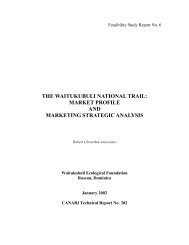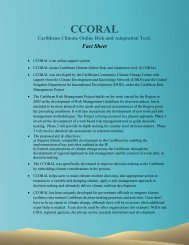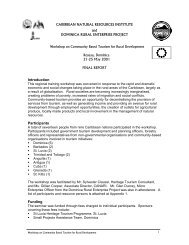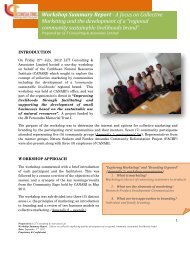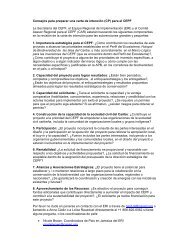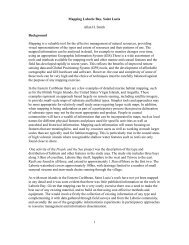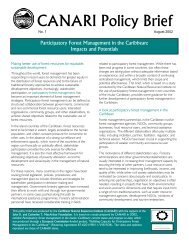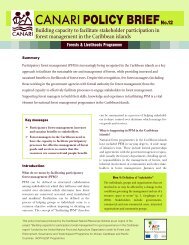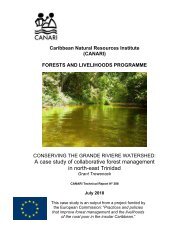Addressing Climate Change in the Caribbean: A Toolkit ... - CANARI
Addressing Climate Change in the Caribbean: A Toolkit ... - CANARI
Addressing Climate Change in the Caribbean: A Toolkit ... - CANARI
Create successful ePaper yourself
Turn your PDF publications into a flip-book with our unique Google optimized e-Paper software.
The climate is chang<strong>in</strong>g faster than policies and programmes <strong>in</strong> most countries. The risks and<br />
threats of climate change are not always considered <strong>in</strong> decision mak<strong>in</strong>g and how we do th<strong>in</strong>gs is<br />
often based on assumptions of old conditions. This may no longer be useful for us <strong>in</strong> an<br />
environment where climate change risks are gett<strong>in</strong>g greater.<br />
Policies and approaches that were once appropriate may no longer be so. The policies regard<strong>in</strong>g<br />
fisheries, hous<strong>in</strong>g, transportation and agriculture, for example, may have to be changed or new ones<br />
<strong>in</strong>troduced to address conditions which did not exist before. National development plans now have to<br />
take climate change <strong>in</strong>to account if <strong>the</strong>y are to be susta<strong>in</strong>able.<br />
If those who provide food (our farmers and fishers) are adversely affected, whe<strong>the</strong>r <strong>in</strong> mounta<strong>in</strong>ous<br />
or coastal areas, and are unproductive because of flood<strong>in</strong>g or land slippage and road destruction,<br />
<strong>the</strong>n we will be challenged to f<strong>in</strong>d someth<strong>in</strong>g as basic but important as food. This may mean <strong>the</strong>n<br />
that policies regard<strong>in</strong>g agriculture and fisheries or agricultural and coastal areas may have to change<br />
to take <strong>in</strong>to account <strong>the</strong> <strong>in</strong>creased risks fac<strong>in</strong>g <strong>the</strong>se sectors or zones.<br />
<strong>Climate</strong> change advocacy may not always have to do with adjust<strong>in</strong>g or <strong>in</strong>troduc<strong>in</strong>g new policies.<br />
There is a strong case for call<strong>in</strong>g for effective application of exist<strong>in</strong>g policies and regulations,<br />
especially those relat<strong>in</strong>g to land use plann<strong>in</strong>g and environmental management. Many countries have<br />
plann<strong>in</strong>g and environmental legislation, regulations and policies on paper. These are often good<br />
documents that would help streng<strong>the</strong>n national systems aga<strong>in</strong>st climate change impacts if <strong>the</strong>y were<br />
implemented and enforced.<br />
Advocacy can encourage <strong>the</strong> political will to develop and susta<strong>in</strong> climate-friendly policies. <strong>Climate</strong><br />
change advocacy can focus on:<br />
• Ensur<strong>in</strong>g local, national and sector policies and activities take climate impacts <strong>in</strong>to account<br />
and lessen risks; and<br />
• Influenc<strong>in</strong>g your government’s position on climate change <strong>in</strong> <strong>in</strong>ternational negotiations.<br />
National and sector policies<br />
Some of <strong>the</strong> areas <strong>in</strong> which is it important for policies to be responsive to climate change and<br />
climate-friendly are:<br />
• Agriculture<br />
• Disaster Risk Reduction<br />
• Energy<br />
• Environment<br />
• Food Security<br />
• Health<br />
• Hous<strong>in</strong>g<br />
• Land Use and Plann<strong>in</strong>g<br />
• Susta<strong>in</strong>able Livelihoods<br />
• Transport<br />
• Tourism<br />
• Water<br />
See Table 1 for examples of policies that affect <strong>the</strong> ability to cope with climate change.<br />
<strong>Climate</strong> <strong>Change</strong> Community <strong>Toolkit</strong>/Christian Aid (<strong>Caribbean</strong>) 33






